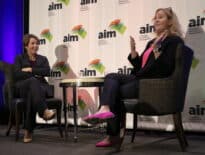Older adults are more likely to see their mortgage applications rejected compared to applicants in other age groups, according to recent research, but the rejections might not point to lender discrimination.
The Center for Retirement Research at Boston College published a brief this month exploring a 2022 working paper by Natee Amornsiripanitch, a senior financial economist with the Federal Reserve Bank of Philadelphia. Using confidential Home Mortgage Disclosure Act data for 2018-2020, Amornsiripanitch’s research looked at applications by a single borrower to refinance to a new rate or term and found an association between age and mortgage denial.
A pattern emerged showing that the probability of rejection increased with age, with the rejection probability accelerating around age 70. The research analyzed both individual ages and age groups. The age groups of 50-59, 60-69 and over 70 all had a higher likelihood of application rejections, the study found.
The research showed the pattern holding up when 2020 data was excluded, which the Center for Retirement Research said ruled out the COVID pandemic as having an effect on the results. Cash-out refinances also showed the same pattern.
“The bottom line is that whether the analysis focuses on age group or individual ages, the probability of rejection of an application increases with age,” the Center for Retirement Research wrote in its brief. “This result is surprising because credit score and wealth are positively correlated with age.”
About 5 million rate-and-term refinances were included in the study. Refinances made up about 27 percent of the total mortgage applications, with borrowers older than age 50 accounting for 40 percent of the refinance applications.
While the top reason that mortgage applications were rejected was high debt-to-income ratio, the research found that insufficient collateral was most likely the reason influencing the pattern of applications being rejected for older adults. Insufficient collateral accounted for 50-70 percent of the age effect, the study found.
“The importance of insufficient collateral is consistent with earlier findings that older homeowners are less able to maintain the quality of their homes,” the brief said. “Therefore, the value of their collateral may have dropped substantially between when they first bought the property and when they applied for refinancing.”
Rejection because of insufficient collateral could also point to a loan amount that has grown relative to the property value, according to the brief, or to a homeowner who has carried a mortgage into retirement because of financial distress and who lacks funds to pay for adequate maintenance.
While lenders cannot discriminate based on age, they can look at several age-related factors, including how long the borrower has until retirement and whether income – including retirement income – will support the extension of credit, according to the brief.
Lenders also might look at life expectancy and mortality risks when considering applications. A borrower’s death increases the likelihood of the loan being paid off or entering foreclosure, both costly for lenders, the brief said.
“The main takeaway is that applicant age and mortgage application outcomes may be correlated because lenders may consider age in connection with a relevant credit risk factor,” the brief said. “Thus, finding a relationship does not necessarily imply that the creditor is violating the law.”







